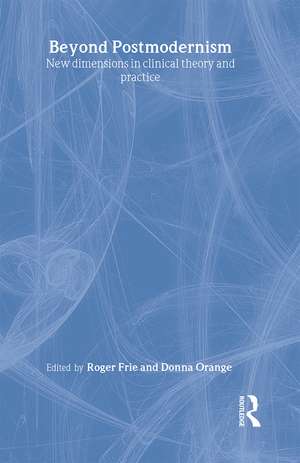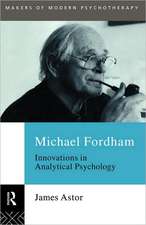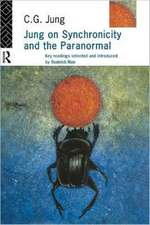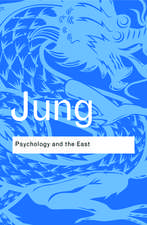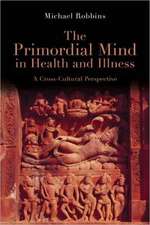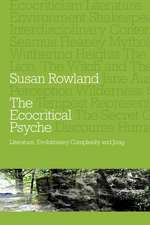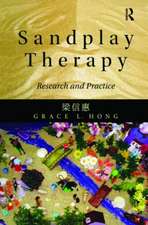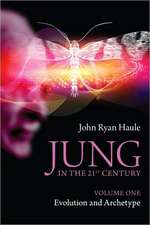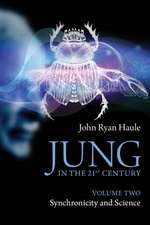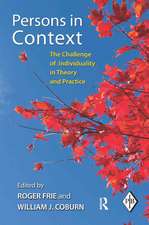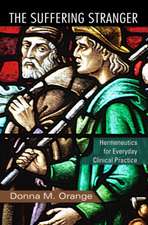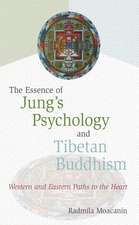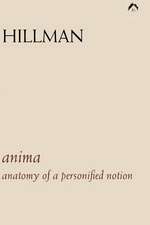Beyond Postmodernism: New Dimensions in Clinical Theory and Practice
Editat de Roger Frie, Donna Orangeen Limba Engleză Hardback – 29 ian 2009
Roger Frie and Donna Orange bring together many of the leading authorities on psychoanalytic theory and practice to provide a broad scope of psychoanalytic viewpoints and perspectives on the growing interdisciplinary discourse between psychoanalysis, continental philosophy, social theory and philosophy of mind. Divided into two parts, Psychoanalytic Encounters with Postmodernism and Psychoanalysis Beyond Postmodernism, this book:
- elaborates and clarifies aspects of the postmodern turn in psychoanalysis
- furthers an interdisciplinary perspective on clinical theory and practice
- contributes to new understandings of theory and practice beyond postmodernism.
| Toate formatele și edițiile | Preț | Express |
|---|---|---|
| Paperback (1) | 374.37 lei 6-8 săpt. | |
| Taylor & Francis – 29 ian 2009 | 374.37 lei 6-8 săpt. | |
| Hardback (1) | 1266.93 lei 6-8 săpt. | |
| Taylor & Francis – 29 ian 2009 | 1266.93 lei 6-8 săpt. |
Preț: 1266.93 lei
Preț vechi: 1333.62 lei
-5% Nou
Puncte Express: 1900
Preț estimativ în valută:
242.58€ • 252.60$ • 201.26£
242.58€ • 252.60$ • 201.26£
Carte tipărită la comandă
Livrare economică 13-27 februarie
Preluare comenzi: 021 569.72.76
Specificații
ISBN-13: 9780415466875
ISBN-10: 0415466873
Pagini: 256
Dimensiuni: 156 x 234 x 18 mm
Greutate: 0.54 kg
Ediția:New.
Editura: Taylor & Francis
Colecția Routledge
Locul publicării:Oxford, United Kingdom
ISBN-10: 0415466873
Pagini: 256
Dimensiuni: 156 x 234 x 18 mm
Greutate: 0.54 kg
Ediția:New.
Editura: Taylor & Francis
Colecția Routledge
Locul publicării:Oxford, United Kingdom
Public țintă
Postgraduate, Professional, and Professional Practice & DevelopmentCuprins
Frie, Introduction: Coherence or Fragmentation? Modernism, Postmodernism, and the Search for Continuity. Part I: Psychoanalytic Encounters with Postmodernism. Eagle, Postmodern Influences on Contemporary Psychoanalysis. Frederickson, Multiplicity and Relational Psychoanalysis: A Heideggerian Response. Teicholz, A Strange Convergence: Postmodern Theory, Infant Research, and Psychoanalysis. Wilkinson, Primary Process of Deconstruction: Towards a Derridian Psychotherapy. Part II: Psychoanalysis Beyond Postmodernism. Orange, Toward the Art of the Living Dialogue: Between Constructivism and Hermeneutics in Psychoanalytic Thinking. Stolorow, Trauma and Human Existence: The Mutual Enrichment of Heidegger’s Existential Analytic and a Psychoanalytic Understanding of Trauma. Frie, Reconfiguring Psychological Agency: Postmodernism, Recursivity, and the Politics of Change. Coburn, Attitudes in Psychoanalytic Complexity: An Alternative to Postmodernism in Psychoanalysis. Elliott, Identity, Identification, Imagination: Psychoanalysis and Modern European Thought After the Postmodern Turn. Modell, Naturalizing Relational Psychoanalytic Theory. Orange, Postscript: From Postmodern Skepticism to the Search for Psychoanalytic Understanding.
Notă biografică
Roger Frie is Associate Professor of Human Development and Educational Psychology, Simon Fraser University, Vancouver; and faculty member at the William Alanson White Institute, New York.
Donna Orange is supervisor and faculty member at the Institute for the Psychoanalytic Study of Subjectivity, New York, and the Institute for Specialization in Self Psychology and Relational Psychoanalysis in Rome/Milan.
Donna Orange is supervisor and faculty member at the Institute for the Psychoanalytic Study of Subjectivity, New York, and the Institute for Specialization in Self Psychology and Relational Psychoanalysis in Rome/Milan.
Recenzii
'The initial deconstructive phase of postmodernism served the important function of waking psychoanalysis from its dogmatic slumber. By criticizing the objectivism, scientism and authoritarianism of the reigning paradigm, it opened the field to the sort of fundamental debate it had not witnessed in decades, and introduced a new openness and pluralism among analysts. But that initial phase has run its course, and the ritualistic repetition of deconstructive tropes has become a tiresome exercise. What is required now is a reconstructive phase that would ask the hard and unavoidable questions that arise after critique has done its work. Today we must ask what objectivity can mean after the critique of objectivism, what sciences can mean after the critique of scientism, what authority can mean after the critique of authoritarianism and what asymmetry means after the critique of one-person psychology. The rich collection of papers by well-known psychoanalytic theorists published in this volume makes an excellent contribution to this task. Let the heavy lifting begin.' Joel Whitebook, Faculty, The Columbia University Center For Psychoanalytic Training and Research
